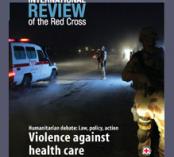
Health workers and patients face extraordinary risks in today’s armed conflicts. Part I of the International Review of the Red Cross’s thematic issue on violence against health care focuses on patterns of attacks, based on results from data collection and field studies. The issue also outlines the legal and ethical frameworks that apply to the provision of health care.
Articles in this issue include:
- Violence against health care: giving in is not an option
- Interview with Walter T. Gwenigale, Minister of Health and Social Welfare of the Republic of Liberia
- Violence against health care: insights from Afghanistan, Somalia, and the Democratic Republic of the Congo
- Making sense of apparent chaos: health-care service provision in six country case studies
- The role of health-related data in promoting the security of health care in armed conflict and other emergencies
- In conversation with the members of the National Permanent Roundtable for the Respect of the Medical Mission in Colombia
- The legal framework applicable to insecurity and violence affecting the delivery of health care in armed conflicts and other emergencies
- States’ obligations to mitigate the direct and indirect health consequences of non-international armed conflicts: complementarity of IHL and the right to health
- A human rights approach to health care in conflict
- Medical ethics in peacetime and wartime: the case for a better understanding
- Can the incidental killing of military doctors never be excessive?
- New publications in humanitarian action and the law
In A human rights approach to health care in conflict, Katherine Footer and Leonard Rubenstein affirm the importance of human rights for the protection of health care in situations to which international humanitarian law does not apply, or as a complement to it. “In times of armed conflict, international humanitarian law (IHL) provides robust protection to health care services, but it also contains gaps” they write. “Moreover, IHL does not cover situations where an armed conflict does not exist.” They point to the Committee on Economic, Social and Cultural Rights General Comment No. 14 (on Article 12 of the International Covenant on Economic, Social and Cultural Rights) as a “framework from which states’ obligations to respect, protect and fulfil the right to health across all conflict settings can be further developed.”
Footer is a research associate and Rubenstein is director of the Program on Human Rights, Health, and Conflict at the Center for Human Rights and Public Health of the Johns Hopkins Bloomberg School of Public Health. He is also chair of the Safeguarding Health in Conflict Coalition.
Violence against Health Care: Part I: The Problem and the Law is available on the ICRC’s website.

